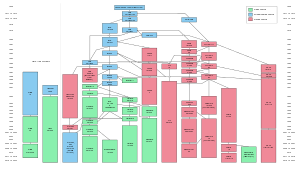
Back Unix-in tarixi Azerbaijani Geschichte von Unix German تاریخچه یونیکس Persian Storia di Unix Italian Unixの歴史 Japanese Historia systemu operacyjnego Unix Polish یونکس کی تاریخ Urdu
 Evolution of Unix and Unix-like systems | |
| Developer | Ken Thompson, Dennis Ritchie, Brian Kernighan, Douglas McIlroy, and Joe Ossanna at Bell Labs |
|---|---|
| Written in | C and Assembly language |
| OS family | Unix |
| Working state | Current |
| Source model | Historically closed source, now some Unix projects (BSD family and Illumos) are open sourced. |
| Initial release | 1969 |
| Available in | English |
| Kernel type | Monolithic |
| Default user interface | Command-line interface & Graphical (X Window System) |
| License | Proprietary |
| Official website | opengroup |
The history of Unix dates back to the mid-1960s, when the Massachusetts Institute of Technology, AT&T Bell Labs, and General Electric were jointly developing an experimental time-sharing operating system called Multics for the GE-645 mainframe.[1] Multics introduced many innovations, but also had many problems. Bell Labs, frustrated by the size and complexity of Multics but not its aims, slowly pulled out of the project. Their last researchers to leave Multics – among them Ken Thompson, Dennis Ritchie, Doug McIlroy, and Joe Ossanna[2] – decided to redo the work, but on a much smaller scale.[3]
In 1979, Ritchie described the group's vision for Unix:[3]
What we wanted to preserve was not just a good environment in which to do programming, but a system around which a fellowship could form. We knew from experience that the essence of communal computing, as supplied by remote-access, time-shared machines, is not just to type programs into a terminal instead of a keypunch, but to encourage close communication.
- ^ Stuart, Brian L. (2009). Principles of operating systems: design & applications. Boston, Massachusetts: Thompson Learning. p. 23. ISBN 978-1-4188-3769-3.
- ^ Mahoney. "In the Beginning: Unix at Bell Labs". self.
- ^ a b Ritchie, Dennis M. (1984). "The Evolution of the Unix Time-sharing System". AT&T Bell Laboratories Technical Journal. 63 (6 Part 2): 1577–93. doi:10.1002/j.1538-7305.1984.tb00054.x. S2CID 571269. Archived from the original on 6 May 2010. As PDF
© MMXXIII Rich X Search. We shall prevail. All rights reserved. Rich X Search